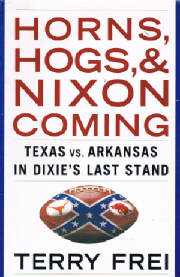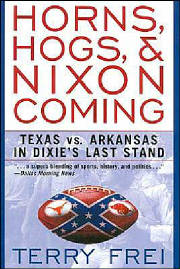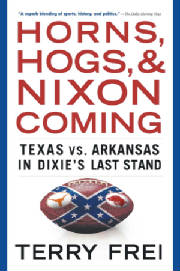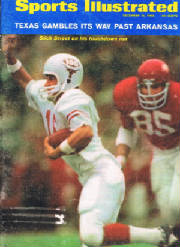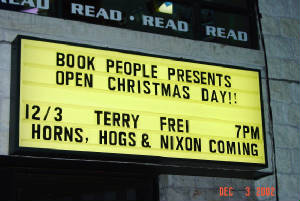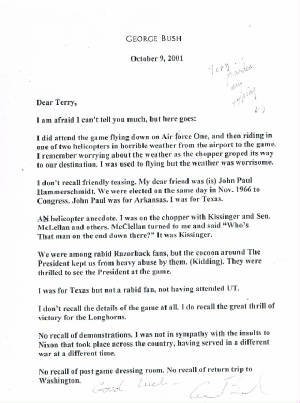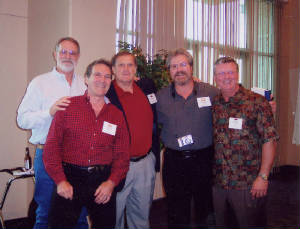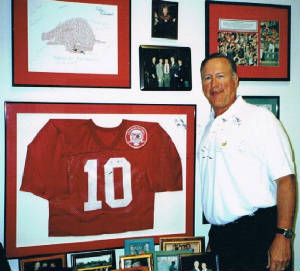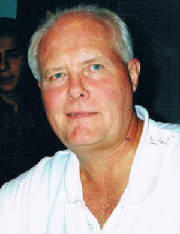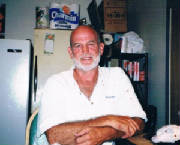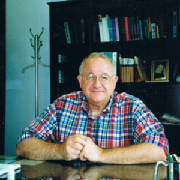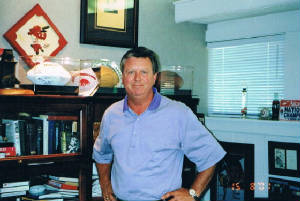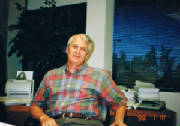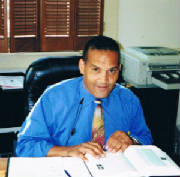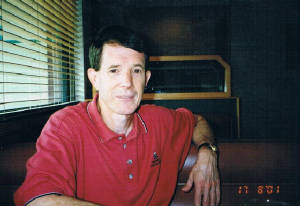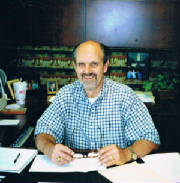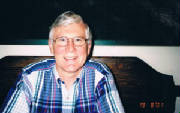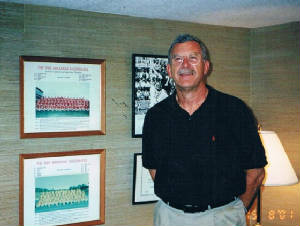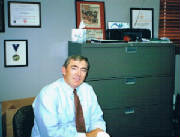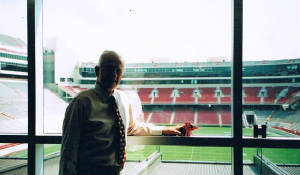| |
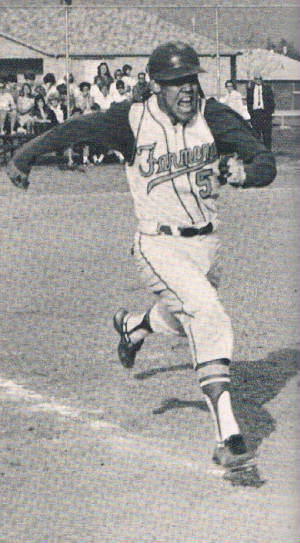 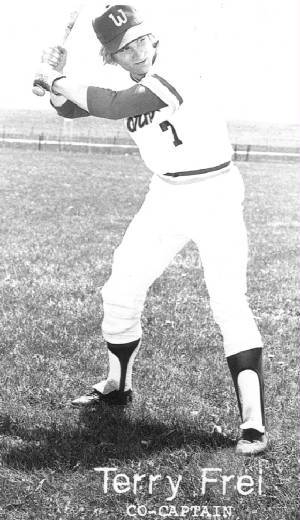
Freddie Steinmark and Terry Frei
as Wheat Ridge Farmers "Frei went to Wheat Ridge High School,
which produced not only (Freddie) Steinmark, but also Texas guard Bobby Mitchell, whose brother was killed in Vietnam. In
part because his father then was the head football coach at the University of Oregon, Frei possesses the football expertise,
an uncanny ability to buttonhook diverse personal anecdotes together and appreciation for history to best tell this remarkable
tale." --John
Moore, The Denver Post
"Everyone knows that
football today is a far cry from what it was in the days of leather helmets and dropkicks, but it takes a book like Terry
Frei's 'Horns, Hogs, and Nixon Coming' to show how much the game has changed in just the last three decades. Frei does so
by chronicling what might have been the final game of the God-Family-Football era, before shoe companies, superagents and
TV networks turned the muddy old gridiron into a multigazillion-dollar business." -- Charles Hirshberg, Sports Illustrated
"Some of us codgers on the scene thought we knew all facets of The
Great Shootout. But now, 33 years after that climatic Arkansas-Texas game, comes a most intriguing account on whys and wherefores
and backgrounds and personality quirks, warts and all, and political implications (Vietnam protests) and whatever. (That climatic
week just happened to be the time when Bill Clinton got his ROTC draft deferment from an UofArkansas official, whose daughter
was dating a Razorback player, etc.) Title is 'Horns, Hogs and Nixon Coming' and it's by Terry Frei, who must have worn out
a dozen tape recorders in the process." -- Blackie Sherrod, Dallas Morning News
"It was a bit like stumbling upon a family history as written by a distant cousin . . . But
much to the dismay of our most cherished prejudice, an outsider, a furriner, a Coloradan for gosh sakes, has seen things we
couldn't. Like a Tocquevillian sportswriter in a new world, Terry Frei does the unexpected, if not the impossible: He makes
'thatdamngame'--and all the cultural, political, and social issues swirling around it like so much red-and-white confetti--seem
new again, relevant again."
--Kane Webb in a lead
editorial, Arkansas Democrat-Gazette
"In some spots, a reader may laugh out loud. There also
may be some tears, especially in regard to courageous Texas defensive back Freddie Steinmark, who six days after playing in
the Big Shootout had his left leg amputated because of a cancerous bone tumor and died in 1971. . . "Frei does a masterful job of weaving in the historical
significance of the turbulent times, including Vietnam protests, the military draft lottery and the civil rights movement
that were so much a part of campus life in that era. It's political football at its best." -- Bob Holt, Arkansas Democrat-Gazette "The great sports books eventually aren't about the game or the scoreboard result, but about the characters
involved -- on the field, in the stands, outside the stadium, around the country -- and the times, (and) appeal to more than
just the sports fan. Frei's account of an important moment of Arkansas and Texas sports history is great because of that and
can mean something to the average readers off in Oregon or Connecticut." --Jim Harris, Arkansas Times, Little Rock "Frei's often humorous telling is much more than a rehash of the game. . . (It) also serves as a larger
history of the social and political climate surrounding the competition. (The book) is a delightful, well-researched chronicle
of a turbulent era." -- Larry Little, Library Journal
"A great story, well-told, with more delicious details than a linebacker could handle." --David Hendricks, San
Antonio Express-News
President Richard Nixon sat in the Razorback Stadium stands at the Big Shootout. Among his
group were Arkansas Governor Winthrop Rockefeller; Arkansas U.S. Senators John McClellan and J. William Fulbright; and Congressmen
(and close friends) John Paul Hammerschmidt of Arkansas and George H.W. Bush. Fulbright, one of the Senate's leading anti-Vietnam
War voices and chairman of the Senate Foreign Relations Committee, had been a football star, student body president and also
the university president at Arkansas before going into politics. Tied to Frei's research for Horns, Hogs, and Nixon Coming was a treasured chain of communication with Bush, the World War II flyer and 41st U.S. president; and
a chance to travel to Harrison, Arkansas, to meet Hammerschmidt -- interviewed on the phone for the book -- in person and
deliver the John Paul Hammerschmidt Lecture at North Arkansas College. Hammerschmidt also had been a World War II pilot, flying
"The Hump" in the China-Burma-India Theater. HHNC discussed the anti-war protest going on on the hill beyond the stadium, led by Vietnam veteran and Arkansas student Don Donner, but noted that
ABC ignored it.The politicians couldn't miss it. As HHNC also disclosed, the traveling party didn't know it, but
Arkansas' black students and sympathizers were prepared to storm and occupy the field if the Arkansas band played the song "Dixie,"
up to then the unofficial athletic anthem at the school. So there was much in the air besides football that day, and the
book's subtitle -- ...Dixie's Last Stand -- could and should be interpreted several ways, both involving
the region and Southern sports being at a crossroads, and more simply, the symbolic stand over the song itself.
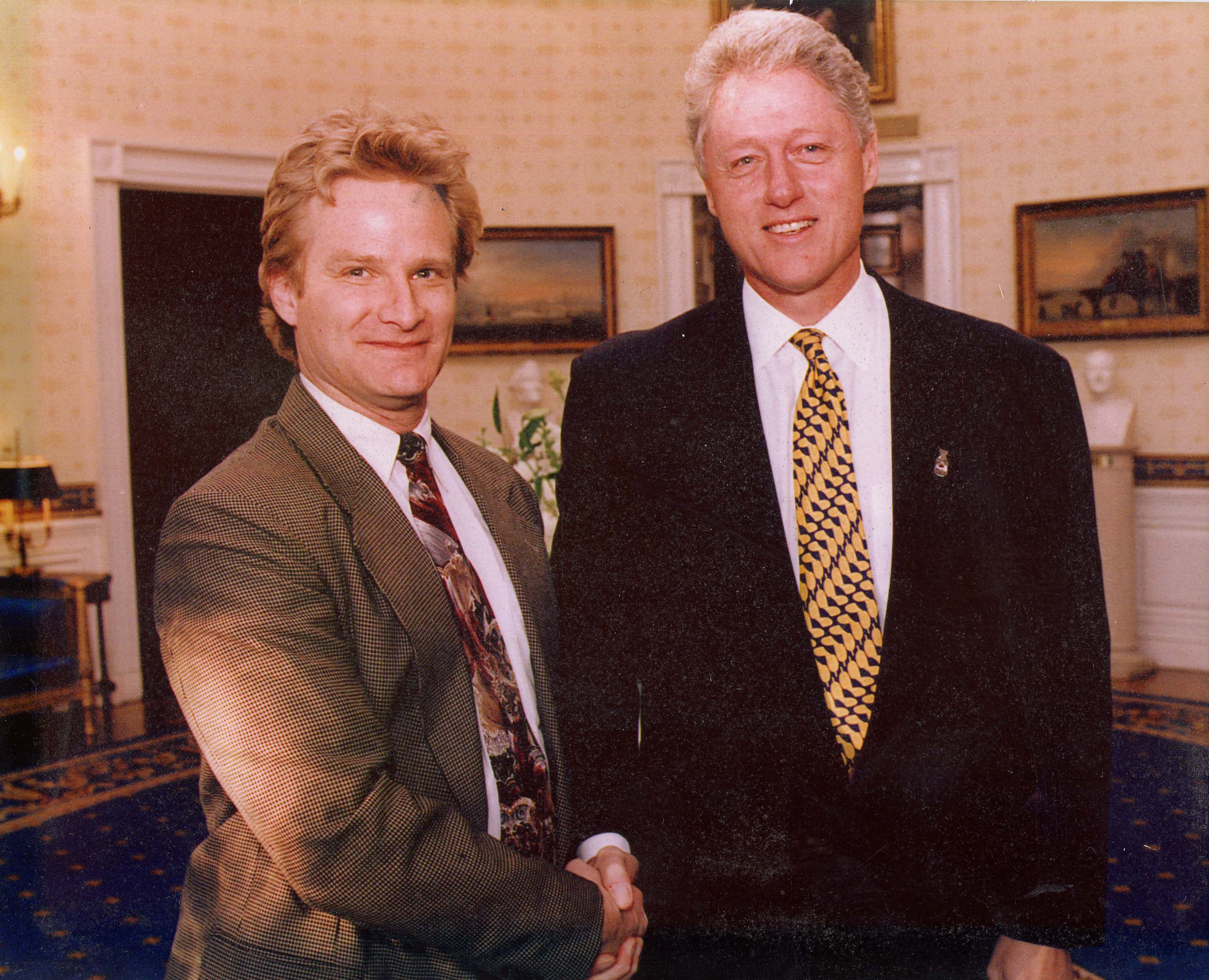 Terry Frei and Bill Clinton in the White House,
1997 Bill Clinton was in England when the Texas-Arkansas game was played,
but that was the week he wrote what would turn out to be his notorious letter to Colonel Holmes, the head of the Arkansas
ROTC program. Clinton had drawn a high number in the draft lottery on December 1, and his angst-filled letter to Holmes about
pulling out of his commitment to take advanced ROTC in exchange for Holmes' earlier help in quashing his induction notice
was released and was an issue in the 1992 presidential campaign. At the time, Colonel Holmes did not speak with the media
beyond issuing an affidavit. However, Holmes did speak with Terry Frei in 2001 -- in part because Arkansas star tailback
Bill Burnett was dating his daughter in 1969, and later became his son-in-law. Over thirty years later, Holmes still was angry. Through a spokesman,
Clinton declined Terry Frei's interview request. Yet the former president apparently believes he was treated fairly in HHNC.
(After all, his desire to avoid serving in Vietnam was not unique, and it was a "bipartisan" phenomenon.) In his
autobiography, My Life, he writes of sending his letter to Holmes. Then he discusses renting a short-wave
radio in England to be able to listen to the game.
Clinton wrote: "We had a
few friends over who thought we had lost our minds as we whooped and hollered through a football game so exciting it was billed
as the Game of the Century. For a few hours, we were innocent again, totally caught up in the contest. The game and its cultural
contexts have been beautifully chronicled by Terry Frei in his book Horns, Hogs and Nixon Coming."
After Holmes died in 2005, Pulitzer Prize-winning editorial writer Paul Greenberg
of the Arkansas Democrat-Gazette, no Clinton fan, quoted Frei's passages on Holmes and also
praised Horns, Hogs, and Nixon Coming as "one of the better - and most readable — books of social
history published in recent years."
Excerpts:
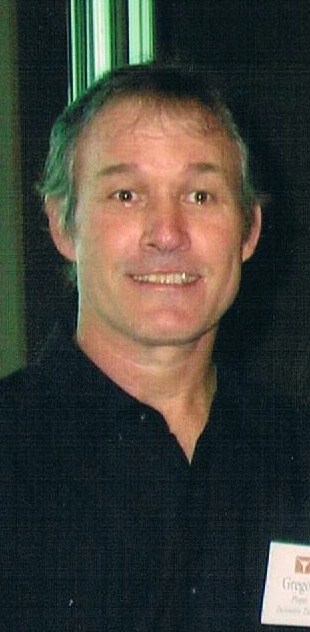 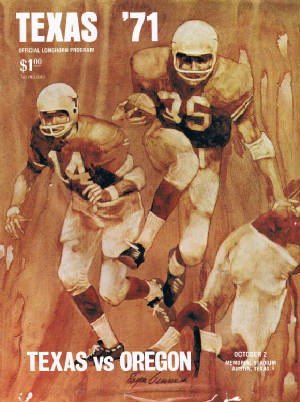 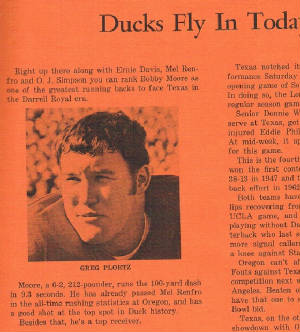
Left:
Ex-Texas defensive tackle Greg Ploetz in 2004 Center and right: When Jerry Frei-coached Oregon Ducks faced Longhorns in Austin in 1971, Ploetz was featured in
the program. The Greg Ploetz CTE Saga One of the figures in Horns, Hogs, and Nixon Coming was Texas defensive tackle Greg Ploetz.
An art teacher and coach, Greg began displaying signs of brain injury and dementia and his wife, Deb, at one point brought
him to Colorado to be able to use marijuana based products in his treatment. He died in 2015 and Deb sued the NCAA in a potentially
landmark case. Terry Frei wrote many pieces about Ploetz's struggle and death, and the antipathy for football that led Deb to file
the lawsuit. August 30, 2019: Year after lawsuit settlement, Deb Ploetz still at war
with football 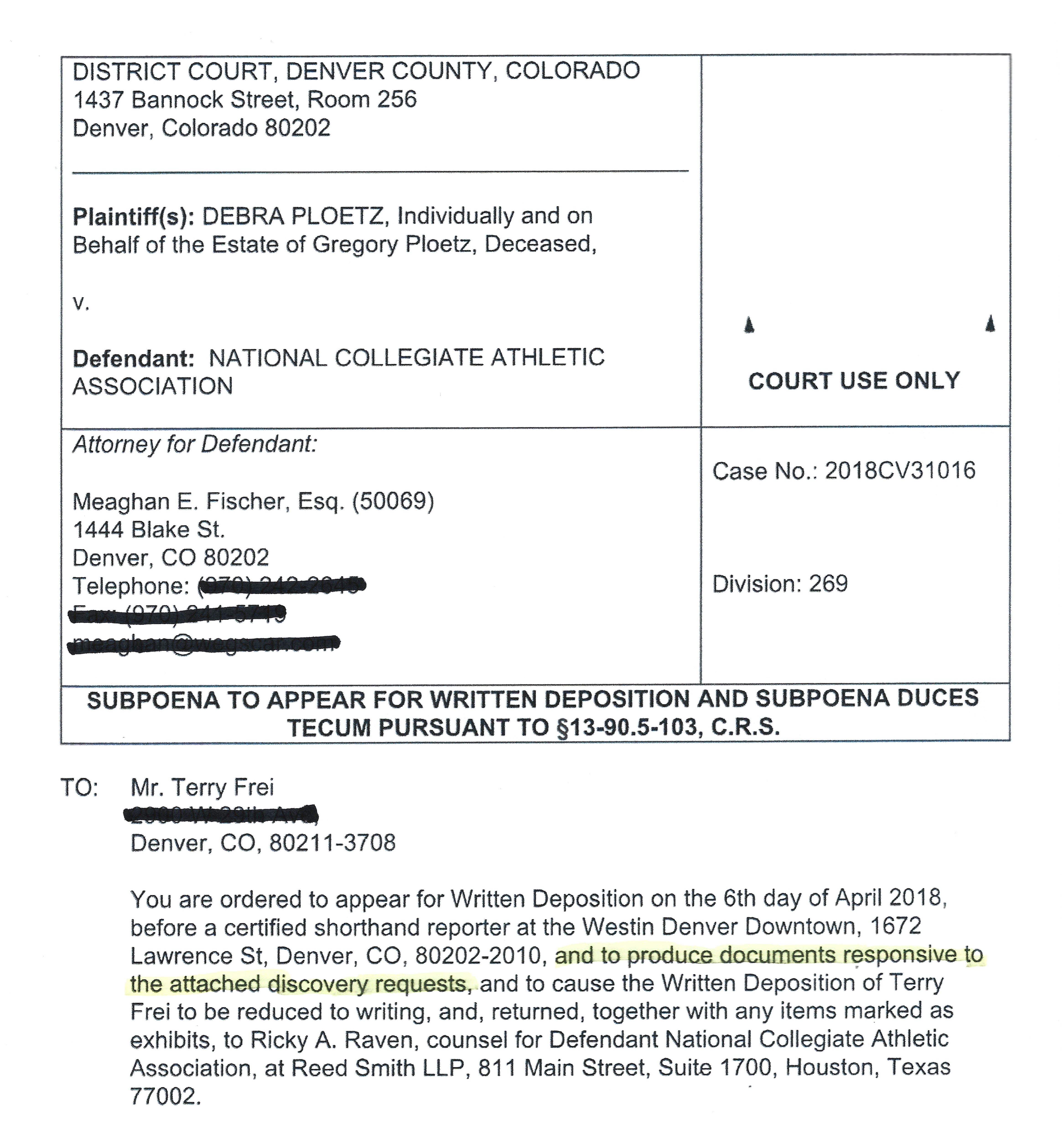
April 2018: Subpoenaed and deposed in Ploetz vs. NCAA January 17, 2017: Deb Ploetz files suit against NCAA Dec. 20, 2015: Greg Ploetz found to have
Stage 4 CTE May 14, 2015: Greg Ploetz dies at age 66 Jan. 19, 2015: Deb Ploetz's battle with football Jan. 19, 2015: A plan to get UT players' signatures on a Greg Ploetz painting Oct. 28, 2014: Greg Ploetz teammate Julius Whittier files class action
suit against NCAA May 31, 2014: Greg Ploetz brought to Colorado for marijuana-product treatment 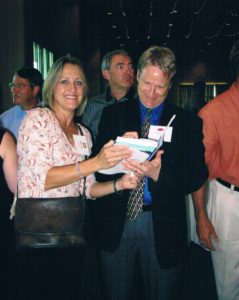
Neutral keynote speaker Terry Frei signs copy of Horns, Hogs,
and Nixon Coming at 2004
joint reunion of the '69 Longhorns and Razorbacks. 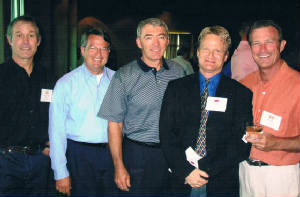
Greg Ploetz is
at left and Terry Frei is second from right in this shot from the 2004 joint reunion. Also pictured are Benton County Judge John Scott, Arkansas
kicker Bill McClard, and at right,
Longhorns rover Mike Campbell. Arkansas Fight (SBNation) interview with Terry Frei at 40th anniverary of Big Shootout (2009), Part One
Arkansas Fight (SBNation) interview with Terry Frei at 40th anniversary of Big Shootout (2009), Part Two
Terry Frei's 2005 newspaper column on his fellow
Wheat Ridge High School alumnus, Freddie Joe Steinmark: Steinmark lives on in memories In Houston's M.D. Anderson Hospital on Dec.
12, 1969, Denver native and Texas Longhorns safety Freddie Joe Steinmark woke up after bone cancer surgery.
His
mother, Gloria, was there. On Friday, as she sat in the dining room of her Aurora home, she recalled the conversation.
"First thing he said to me was, 'Did they take ...,"' Gloria said.
There was no need to finish
the question. Surgeons had removed Freddie Joe's cancer-riddled left leg.
"I said, 'Yes, Freddie,"' Gloria
said.
"He said, 'You know what I've been thinking?'
"I said, 'What have you been thinking?'
"He said, 'Do you think if I get good at that prosthesis and I can move around good, do you think Darrell Royal
would let me be the kicker?'
"I said, 'Freddie, you'll have to ask him."'
That was Freddie
Joe. After coming out of the fog and hearing that he would live the rest of his life without his left leg, his first words
were tongue-in-cheek, but made a serious point. Steinmark, a Denver Post Gold Helmet winner as a star athlete at Wheat Ridge
High School, would fight.
The operation came only six days after he played for the top-rated Longhorns in their
celebrated Dec. 6, 1969, showdown with No. 2 Arkansas, the game at Razorback Stadium attended by President Richard Nixon and
Texas Congressman George Herbert Walker Bush, and passionately followed on short-wave radio in England by Rhodes Scholar and
Arkansas fan Bill Clinton.
In my 2002 book "Horns, Hogs, and Nixon Coming," I called Steinmark's play
that day the most courageous effort ever in a football game. I have gotten no arguments since.
Freddie's leg had
been aching most of the season. He played on a leg being eaten up by cancer, and doctors later told the Longhorns it was amazing
the bone hadn't snapped. Finally, after the game at Arkansas, he had it checked.
Three weeks after surgery, on
Jan. 1, 1970, the day Texas clinched its last bona fide national championship with a 21-17 victory over Notre Dame in the
Cotton Bowl, Steinmark was on the sideline among his teammates. His younger brother, Sammy, also was with him. His parents,
Denver police officer Freddie Gene and Gloria, and two sisters were in the Cotton Bowl stands. On crutches and one leg, wearing
a football shoe on his right foot, Freddie watched proudly, defiantly, and, significant given his plight, faithfully. The Longhorns presented their
plucky safety with a game ball. "He
was so elated," Gloria recalled. "I really think they wanted to win for Freddie, too." I could nod at that, because I have spoken with dozens of his
former Longhorns teammates, including 1969 starting Texas guard Bobby Mitchell, the Dallas dentist who also went to Wheat
Ridge. It happened again and again: Reminiscing former football players laughed and smiled through their memories of their
younger days, and when the subject turned to Steinmark, a junior during that 1969 season, the words caught in their throats.
The Longhorns knew how to have a good time. While they did, Freddie was studying. Or in church.
"It makes you cry to think about it now," said 1969 Texas tackle
Bob McKay, who in more casual conversation might be the funniest man on the planet. "He was the greatest kid in the world."
Gloria Steinmark and her family - including Sammy and daughters Paula Kay "P.K." Stevinson and Gloria Gene
"GiGi" Kunz, who all live in the Denver area - hope the Longhorns end up with another national championship Wednesday.
"Absolutely," Gloria said. "You can't get over those things. ... Oh, I'll cry. My tears come easy."
The modern Longhorns still touch a Steinmark plaque on their way from the dressing room to the field in Austin. The
stadium scoreboard is named after Steinmark. They are memorials. Freddie Joe died June 6, 1971. He was 22.
Gloria,
widowed in 2000, still has her son's Cotton Bowl game ball. Freddie Gene labeled it, to keep it straight from all the other
memorabilia from his son's life. Among the portraits of Freddie displayed in the Steinmark home are one painted by former
Texas and NFL star Tommy MacDonald and another drawn from the picture of Freddie on the Cotton Bowl sideline used on the cover
of "I Play to Win," Steinmark's inspiring 1971 book.
Gloria said it still can be painful to talk about
Freddie Joe. "That scar just never goes away," she said.
But does he live on?
"Oh, absolutely,"
she said. She laughed and added, "I talk to him all the time." Then she thought a little more about the son who
never called her "Ma" or "Mom" - or anything but "Mother."
"You know,"
she said, "he was such a loving kid and humble, with such a good sense of humor. He and I got along famously. He always
had something good to say about everything and everybody. That was just him. ...
"When he was suffering so
bad in the end, he was telling me something so nice about someone. I was leaning over the bed and looking at him and I said,
'You know, Freddie Joe, you are such a good boy.' He said, 'Aw, Mother, I'm not good. Only God's good."'
The
Steinmarks are fervent Catholics. Freddie Gene and Gloria Marchetti met in the hallways of Denver's North High, when Freddie
Gene, the celebrated star high school athlete in the Denver of another era, mischievously asked the shy sophomore girl, "Don't
you ever speak?", and then gave her his letter sweater to wear. Faith was the hallmark in Gloria's and Freddie Gene's
household, and it was Freddie Joe's.
"I used to think it, but I know not to say 'why' anymore," Gloria
said. "I think he was so special, God wanted him." 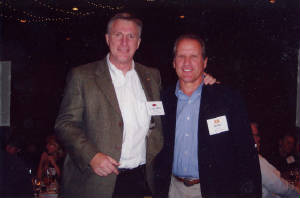 At the
2004 joint reunion of the Longhorns and Razorbacks, where Terry Frei was
the neutral keynote speaker. The Longview Boys: Arkansas defensive tackle Terry Don Phillips and Texas quarterback James Street.
Texas tackle Bob McKay, Texas fullback Steve Worster, Arkansas defensive end Bruce
James, Texas tackle Bobby Wuensch, Arkansas
receiver Chuck Dicus.
Horns and Hogs during book interview period,
2001 Arkansas quarterback Bill Montgomery
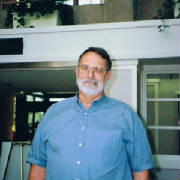
Texas tackle Bob McKay
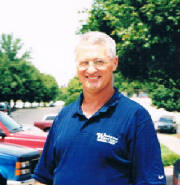
Arkansas linebacker Mike Boschetti
(as in "Boschetti was clipped!")
Texas halfback Ted Koy
Arkansas tackle Mike Kelson
Texas kicker Happy Feller
Arkansas fullback Bruce Maxwell
Texas linebacker Scott Henderson
Arkansas receiver Chuck Dicus
Texas linebacker Bill Zapalac
Arkansas receiver Jon Rees
Arkansas halfback Bill Burnett
Texas tight end Randy Peschel
Arkansas safety Dennis Berner
Arkansas guard Jerry Dossey
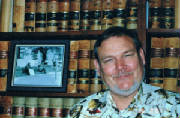
Vietnam vet, UofA student, antiwar
leader Don Donner
Arkansas kicker Bill McClard
Arkansas coach Frank Broyles
|
|
